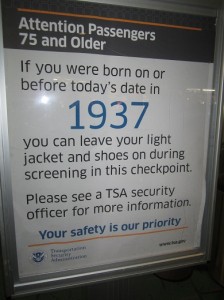 When I was in high school, Chicago’s O’Hare airport had the distinction of being “the busiest airport in the world.” My good friend Lynn and I, for lack of anything better to do, sometimes enjoyed a Friday evening at the airport watching (and analyzing) the steady parade of travelers.
When I was in high school, Chicago’s O’Hare airport had the distinction of being “the busiest airport in the world.” My good friend Lynn and I, for lack of anything better to do, sometimes enjoyed a Friday evening at the airport watching (and analyzing) the steady parade of travelers.
Since there were no security checks in the 1960’s, we’d watch the boards for plane arrivals and then head for the gate as passengers disembarked. One of us would slip into the crowd coming off the plane, then squeal and scream when we saw each other, in a bogus reunion. Watching strangers respond was entertaining, and it didn’t cost a penny.
Fifty years have passed since then, and now no one gets to a gate without a boarding pass. We live in a day of terrorism, and to cooperate with airport safety, we have to undress to pass through security. “Remove your shoes, belts, hats, jackets, watches and jewelry, even pocket change.” Men have to clutch their pants as they walk through metal detectors, nervous they’ll be asked to hold their arms out for a wanding.
But there’s fresh hope for improvement in this overkill process. While waiting in a security line before my last plane trip, I saw something new, a giant poster that said, “Attention Passengers 75 and Older. If you were born on or before today’s date in 1937, you can leave your light jacket and shoes on during screening in this checkpoint.”
Finally! A reasonable idea.
Our country is famous for going to extremes, and we love criticizing and teasing about it. But truth be told, most of us find ourselves lured to excessiveness once in a while, too. If some is good, more must be better. If cutting back is wise, then having none is wiser.
In one sense, even Scripture promotes extremes:
- It says we should willingly lose our lives to God in order to gain them back.
- When God purged the Israelite camp of sin, he destroyed men, women, children, and even their animals.
- Jesus said, “If you want to follow me, forsake everything else first.”
But other Scriptures encourage us to walk a middle line: “Moderation is better than muscle, self-control better than political power.” (Proverbs 16:32)
So what are we to do? What standard should guide us?
The answer is in “the who.” If it’s something that’s between God and us, we have to comply with the extremes he requires; we’re either all-in, or all-out.
But if it’s something strictly human, he encourages moderation: not too much rest but just enough; not too much work but just enough; not too much food but just enough.
I guess that should go for airport security measures, too. Caution is good, but undressing is extreme. And screaming in bogus airport reunions? Downright foolishness.
“Do not be overrighteous, neither be overwise… Do not be overwicked, and do not be a fool… It is good to grasp the one and not let go of the other. Whoever fears God will avoid all extremes.” (Ecclesiastes 7:16-18)


